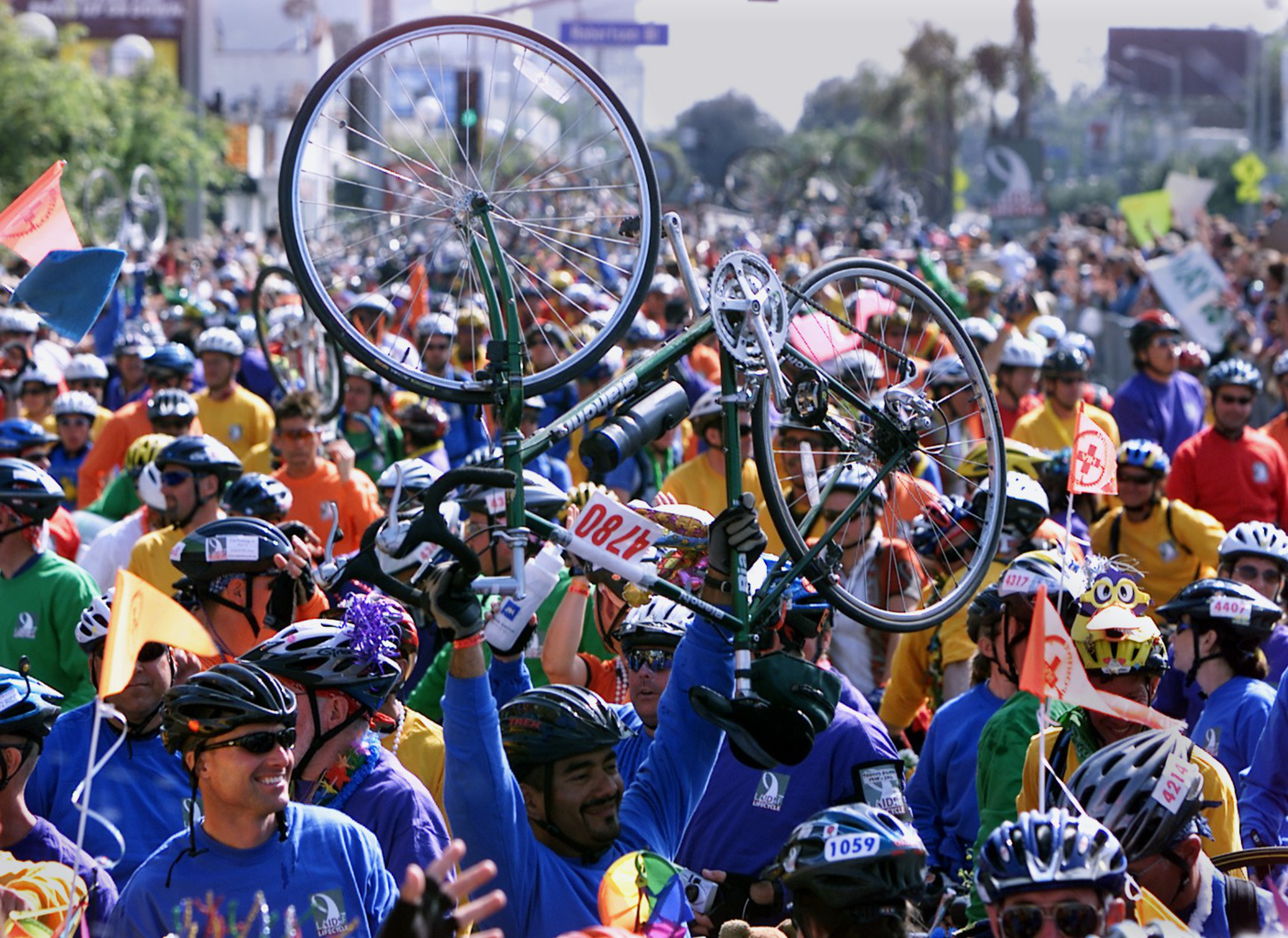Facing plunging ridership and sharply reduced fundraising totals, AIDS/LifeCycle (opens in new tab) announced Wednesday that the 2025 ride from San Francisco to Los Angeles will be the 30-year-old organization’s final adventure on two wheels.
In an online forum, officials with the ride’s two beneficiaries — the San Francisco AIDS Foundation (opens in new tab) and the Los Angeles LGBT Center (opens in new tab) — broke the news to riders, supporters, and members of the LGBTQ+ community.
Peer-to-peer fundraisers and large-scale cycling events have struggled to return to pre-pandemic levels, according to Dr. Tyler TerMeer, CEO of the San Francisco AIDS Foundation and a 21-time rider. “This has resulted in many historically successful cycling events struggling — and AIDS/LifeCycle is no exception,” he said. “Fixed costs have skyrocketed, while participation and fundraising have not kept pace.”
Referring to the ALC community as “the Love Bubble,” Joe Hollendoner, CEO of the Los Angeles LGBT Center, noted that 2025’s ridership is likely to hit capacity as people gather for one last hurrah. While no amount of enthusiasm would alter Wednesday’s decision, he said, the ongoing commitment to ending AIDS leaves the door open for a reimagined event. “The possibilities for 2026 are endless,” Hollendoner said, “but we do not think it will look like the 545-mile [ride].”
Curtis Bass, a community engagement representative with AIDS/LifeCycle, told The Standard that all of the organization’s 18 full-time employees will be laid off as of June 30, 2025. However, the AIDS Foundation disputed that timeline, saying decisions about staffing after next year’s ride will not be made until the spring.
“The bottom line is that we don’t know what comes next yet, but as we plan for future fundraising events, our staffing plans will be built out accordingly,” TerMeer said.
A marquee Pride Month event, AIDS/LifeCycle is a noncompetitive group bike ride that departs from the Cow Palace on the first Sunday in June and arrives in Los Angeles six days later. Having started in 1994 — the year that HIV transmissions in the U.S. peaked — the event has been known for the large teams of cyclists who raise hundreds of thousands of dollars each year for HIV/AIDS care, testing, and prevention.
Each rider commits to raising a minimum of $3,500; over three decades, ALC has raised approximately $300 million. However, as The Standard previously reported, a post-Covid surge in participation did not last, and ridership dropped precipitously from 2,500 riders in 2022 to around 1,400 in 2024. Total fundraising fell from $17.8 million to $10.9 million over that period, and the ALC organization laid off six people and eliminated four vacant positions in August.

Elsewhere in the country, other AIDS rides have also wound down. Only a handful of regional, two- or three-day efforts remain, in Texas (opens in new tab) and on the East Coast.
Part of this decline can be attributed to success in the fight against what was once known as the “gay plague.” Over the past decade, the widespread use of preventive medications like PrEP, or pre-exposure prophylaxis (opens in new tab), helped reduce the number of new cases in San Francisco to 157 (opens in new tab) in 2022, barely one-tenth the peak figure. Consequently, few people under 40 have lost friends and loved ones to the disease, leading to a widespread perception that AIDS is “over.”
The end of the much-larger AIDS/LifeCycle means its two beneficiaries will have to find new ways to fund their work — which, as SF AIDS Foundation CEO Tyler TerMeer noted, is far from finished. About 1.2 million Americans and 40 million people worldwide (opens in new tab) live with HIV. Still, the loss of the ride likely won’t be a death blow to the SF AIDS Foundation, whose revenue sources have always been diversified.
Calling the ride a “bucket-list” event for many participants, TerMeer said interest in the 2025 ride is expected to be high, with many lapsed riders returning for one final tour. “That’s why we want people to know now,” he said. “We want people to have 10 months to plan their lives, so they have a ride that’s filled to the brim with joy.”
The LGBTQ+ community’s response to the news was bittersweet. Three-time rider Brian Entler expressed sorrow about its impending end. “The ALC has enriched my life,” he said. “We have all longed for the day when we would no longer need to fear AIDS, but AIDS is not gone, and we still need the ALC.”
Entler is already registered for 2025.

